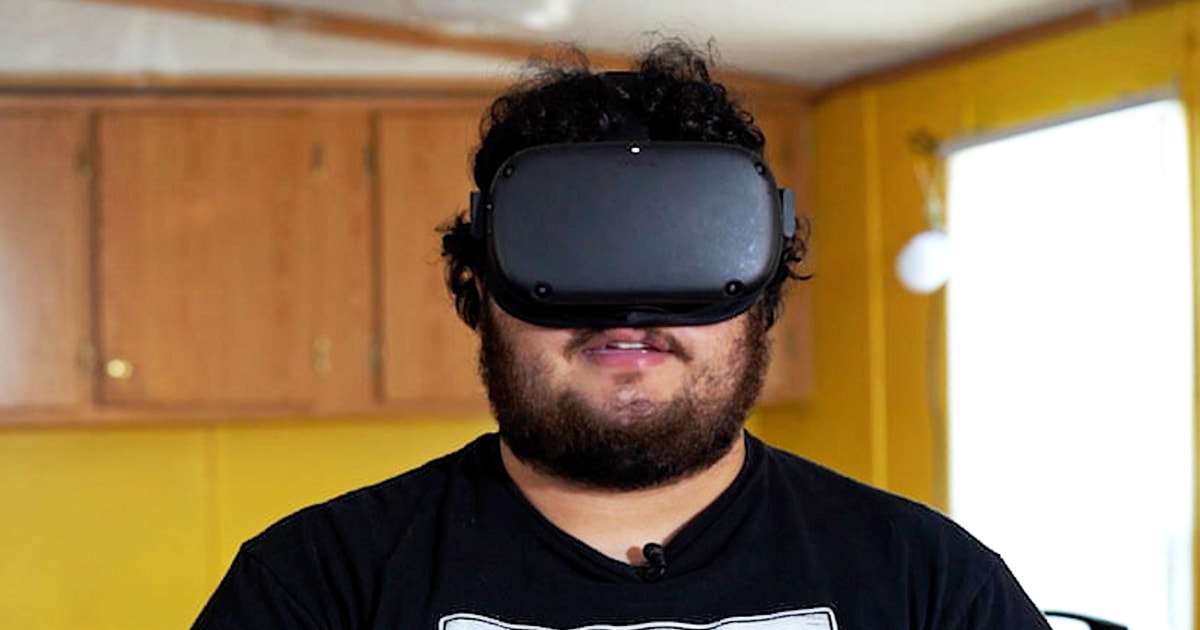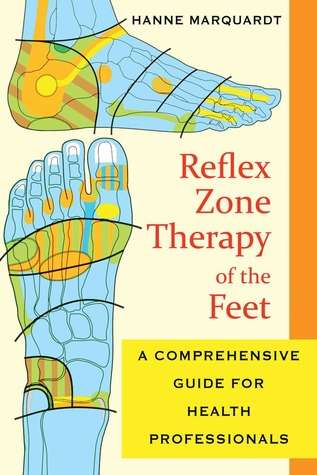After his father died of Covid last fall, Donkan Martinez was overwhelmed by grief and turned to an unlikely outlet: virtual reality.
The 24-year-old found himself wading into an emerging field of virtual mental health care, via a service called Innerworld, which offers peer-led mental health support through its app. The idea is to bring the principles of cognitive behavioral therapy, or CBT, into the metaverse and enable users to interact with others as anonymous avatars through voice- and text-based chat.
CBT aims to help patients change unhealthy thinking or behavioral patterns by developing relevant skills and coping strategies. The American Psychological Association describes it as a form of treatment that helps people “learn to be their own therapists.”
Innerworld, however, gives everyday users the opportunity to deliver support to one another. Its founder, Noah Robinson, emphasizes that the service should not replace professional treatment. Upon registering, Innerworld users must acknowledge that they understand the app is not therapy.
“It’s not therapy and we can’t provide crisis intervention,” Robinson said. “Our goal with Innerworld is to be a longer-term place that people can come to help them prevent themselves from getting to the point of being in crisis. Or we have people who are hospitalized who come out and are looking for additional support.”
Upon entering Innerworld, users can choose from a variety of settings that emulate environments like hiking trails or libraries. From there, they can engage with other avatars or browse a list of peer-led events, such as group meditation sessions, addiction support groups and workshops on navigating social anxiety. Martinez said that once, he joined a game in which users guessed what others were drawing.
The efficacy of Innerworld’s approach is still being studied — the company hopes to publish early data from a small, internal trial that showed decreases in depression and anxiety symptoms among a group of 127 participants. A $206,000 grant from the National Institutes of Health is helping Innerworld fund its research.
Gathering robust, long-term data is crucial to evaluating this or any similar program, said Barbara Rothbaum, a psychologist at the Emory University School of Medicine. Rothbaum published a paper on the use of VR to treat a fear of heights in 1995.
“As far as virtual reality, most of the applications now have used a real therapist,” she said.
Indeed, most therapeutic uses of VR so far have centered on clinician-led exposure therapy for conditions like arachnophobia and claustrophobia, as well as for social anxiety and post-traumatic stress disorder.
However, Rothbaum added, “I do think [VR] could be useful for self-help, but the programs that have been tested haven’t been developed for that.”
Skip Rizzo, director of medical virtual reality at the University of Southern California Institute for Creative Technologies, said he first recognized VR’s potential for mental health uses in the 1990s. Rizzo helped pioneer the use of VR to treat PTSD among members of the military. A 2005 report documented the case of a Vietnam war veteran treated with VR therapy who experienced a 34% decrease in clinician-rated PTSD.

Innerworld.
Innerworld
Rizzo said he sees the potential of Innerworld — as long as the app continues to make clear that it is not clinician-run.
“People that are worried about stigma around whatever the problem is that they have, or they’re ashamed, they might not want to admit to another person directly that they’re having these issues,” Rizzo said. “But they might be more likely to in an avatar-based world where they can preserve their anonymity but still interact with people.”
Martinez said he and other users he’s met on Innerworld felt they weren’t getting the empathy they needed in the real world.
“My real friends don’t know that I’m very emotional. I’m very conservative with my emotions with my real friends,” he said. “I’m able to open up in Innerworld because I know I’m not going to be judged. I’m not going to be attacked.”

Donkan Martinez.
NBC News
Robinson said he was motivated to create Innerworld after finding solace in an online community in his own life. When he was 13, he said, he became depressed after realizing he was gay, and he turned to the online game RuneScape. The anonymity made him more comfortable exploring parts of himself he was afraid to face in the real world. Robinson said he eventually came out to his online friends.
Innerworld is not the only program attempting to use VR to help people access mental health support.
In his own work, Rizzo is piloting a clinician-facilitated VR project that offers social support to Ukrainian refugees. Refugees who have relocated to Bucharest, Romania, can enter a virtual version of a town square in Kyiv, where they can speak with fellow refugees as anonymous avatars.
A startup called BehaVR, meanwhile, launched its app, called First Resort, last week. The VR app guides users through “chapters” on skills that would be taught in CBT sessions.
Risa Weisberg, a professor at the Boston University Chobanian and Avedisian School of Medicine, is BehaVR’s chief clinical officer. She said that because people’s brains process VR experiences in the same way they would a real-life experience, “you don’t experience the interventions as something that you’re reading or hearing; you experience them as something that’s happening to you.”
Weisberg thinks that’s why VR exposure therapy has yielded results in the past.
VR’s reach could grow to 64 million people in the U.S. this year, according to a 2021 estimate by eMarketer. Weisberg said that expansion is occurring at a time when more people are seeking mental health care, but also as many are finding it inaccessible due to high costs.
“All that comes together at the same time to make the next few years really ripe for getting mental health techniques and interventions in VR,” she said. “I think we’re going to see a huge uptick in this.”
Rizzo said his main concern about Innerworld, however, is that people who need professional help might try to substitute the app instead. Rothbaum, meanwhile, said randomized clinical trials will be needed to determine whether these types of programs really work.
Does your mind constantly chatter, whispering negative thoughts? Do you experience radical highs, lows, or both? Does stress feel overwhelming; maybe coping with life has become a challenge? Has your sex drive tanked, do you reach for substances to relax or escape, or are you having trouble sleeping and suffer from exhaustion?
Mental illness is serious. It can extend its tentacles into every aspect of your life, extracting joy. The consequences for your health, relationships, productivity, and longevity are stark and need to be acknowledged; then acted upon.
Yet, for a number of reasons, mental health can take second place. This no longer needs to be the case. High-quality, confidential virtual reality for mental health is available. At XRHealth, degree qualified, licensed therapists provide drug-free, personalized treatment that change lives.
Save
Virtual reality plays role in mental health treatment
By Kasparas Aleknavičius, MD
Source/Disclosures
Disclosures: Aleknavičius reports being head of medical affairs for Kilo Health.
ADD TOPIC TO EMAIL ALERTS
Receive an email when new articles are posted on
.
Please provide your email address to receive an email when new articles are posted on
ADDED TO EMAIL ALERTS
You’ve successfully added to your alerts. You will receive an email when new content is published.
Click Here to Manage Email Alerts You’ve successfully added to your alerts. You will receive an email when new content is published.
Click Here to Manage Email Alerts
We were unable to process your request. Please try again later. If you continue to have this issue please contact [email protected].
The number of Americans with anxiety has skyrocketed from 7% in 2019 to 40% in 2021, according to the CDC. That means more than one in three Americans are experiencing a mental health condition since the pandemic began.
Sadly, the numbers are worse for younger Americans. The CDC and Census Bureau partnered over the summer of 2021 and found that 45% of U.S. residents between the ages of 18 and 29 years have anxiety and depression symptoms.
Many of those same young people might associate virtual reality with games and entertainment, but a new study published in Psychiatry Research (Monaghesh et al.) found that VR therapy can reduce anxiety and depression. According to the study, VR helps patients learn how to manage their symptoms in a simulation, which transfers into the real world.

Kasparas Aleknavičius
This technology might sound like science fiction, but many digital health companies, including Kilo Health, are already developing prototypes of VR therapies to help with mental health and chronic illnesses.
What is VR mental therapy?
VR uses a headset to immerse the wearer in a “virtual reality” that produces real-life experiences for the user. Imagine you have anxiety over public speaking. VR could create a situation where you are speaking in front of thousands of people, without having to recruit crowds to help with your anxiety. Your therapy becomes more real than just speaking with a therapist about your fears, anxiety or depression.
Mental health therapists are already testing various VR programs in their offices. Psious has created 70 different VR environments that enable patients to work through their mental health conditions with a psychotherapist. However, a limitation of this early VR adaption is that patients still must physically go into an office.
The next VR game changer with mental health will take place when consumers can access the technology in the privacy of their own environment.
Trending VR tools for mental health
Regardless of where the VR therapies go in the future, it is almost certain that Oculus will be a dominant headset and controller used by consumers. It is already becoming the go-to platform for several therapies created for patients with anxiety.
People often say they are more afraid of public speaking than death. “Glossophobia” is estimated to affect about 75% of the population.
Samsung has developed the VR mobile app, Fearless, which helps people overcome that fear in the comfort of their own home. The app responds to voice volume, speaking pace, eye contact and heart rate, providing feedback and evaluating progress.
Bridge Trek is another Oculus VR product that manages anxiety and fears in the user’s own environment by turning fears into a game. As the user shows progress, the game gets more difficult and moves onto more stressful situations. This is an early product, but I anticipate more to come this year.
Virtually Better is a platform health professionals are currently testing with their patients. The VR treatments allows therapists to control a patient’s sensory experience. For example, if a patient has a fear of thunderstorms or flying, the VR experience will create the situation for them. The company has created more than 60 research products with psychotherapists for the office and classroom.
AppliedVR, using Curebase’s decentralized clinical trials platform, is another VR option for health professionals to use with their patients struggling with anxiety, stress and pain. More than 30,000 patients across 200 hospitals around the world have already gone through the company’s virtual program. This VR program contains more than 40 immersive environments, including meditation and breathing exercises, “distractional” games and virtual visits.
Many more VR programs for mental health exist, and it will become a more competitive space in the next few years. As patients begin to hear more about VR and become comfortable with it, this new approach to mental health will become even more accepted.
References:
- CDC. Anxiety and depression. https://www.cdc.gov/nchs/covid19/pulse/mental-health.htm. Updated March 23, 2022. Accessed March 30, 2022.
- Curebase, AppliedVR announce agreement to run multiple VR therapy clinical trials. https://www.prnewswire.com/news-releases/curebase-appliedvr-announce-agreement-to-run-multiple-vr-therapy-clinical-trials-301363115.html. Published Aug. 26, 2021. Accessed March 30, 2022.
- Monaghesh E, et al. Psych Res. 2022;doi.org/10.1016/j.psychres.2021.114338.
For more information:
Kasparas Aleknavicius, MD, is head of medical affairs for Kilo Health, where he is involved with clinical product development and digital health research and partnerships.



